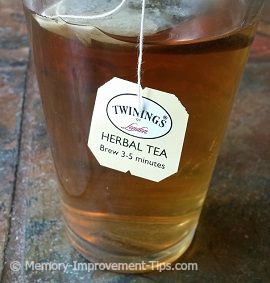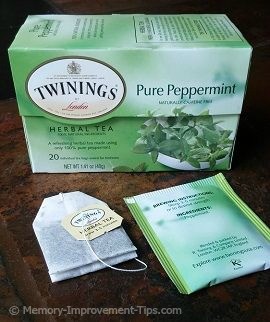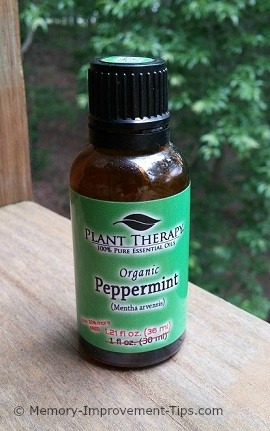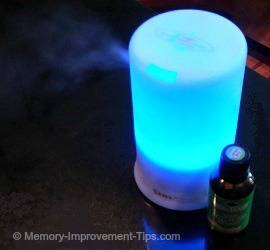- Home
- Better Memory
- Diet and Memory
- Benefits of Peppermint Tea
Health & Brain Benefits of Peppermint Tea & Oil, from Alertness to Headache Relief
The variety of benefits of peppermint tea and peppermint oil is rather surprising. Looking for a healthy way to boost your concentration, calm that tension headache, or relieve intestinal problems? Peppermint may be just what you need.
Scientific research studies tend to support the health benefits of peppermint tea and oil, too (although, as I discuss below, more studies need to be done on some of the claims).
Brew a cup of peppermint tea for alertness, rub peppermint essential oil on your temples for a headache, or swallow enteric-coated peppermint capsules for irritable bowel symptoms. Don't overlook peppermint as a home remedy for relief of these conditions.
I drink peppermint tea almost every day. I find it helps me stay relaxed and focused at work. But as a therapeutic herb, peppermint has several unexpected applications.
The aroma of peppermint has been shown to increase alertness and mood. And peppermint tea's mental boost isn't due to caffeine, either. Unlike other teas, peppermint tea is naturally caffeine free.
Peppermint has also been used to treat digestive problems including heartburn and indigestion. Research even supports the use of peppermint to relieve headaches and calm the symptoms of irritable bowel syndrome (IBS).
There are other peppermint-based products beside tea. For example, you can chew peppermint leaves. Or you can rub peppermint essential oil on your skin.
For digestive issues, swallow the oil as an oral supplement in capsule form or mix a few drops in a glass of water. Keep a peppermint plant on your desk for the brain-boosting menthol odor.
One of my favorite ways to benefit from peppermint's aroma is to
use my essential oil diffuser
to project the oil into the room air as a mist. I often diffuse peppermint in my home gym during a workout to help me focus on proper exercise form and bring intensity to each set.
Not many research studies have examined the benefits of peppermint tea specifically. But the active compounds in peppermint, including menthol and menthone, have been studied. Potentially, drinking the tea provides related benefits, and it has been shown effective for some health conditions as I describe below.
As a fan of peppermint tea, I reviewed the claims and research on peppermint tea and related products to gain a better understanding of the broad range of peppermint's health benefits.
Summary of Main Benefits of Peppermint Tea & Oil
What I found is the best-supported uses and benefits of peppermint tea, peppermint leaves, and peppermint essential oil can be loosely organized into 4 groups:
Brain Benefits. There is evidence suggesting peppermint heightens mental alertness and mood.
A few studies hint that peppermint improves memory, although proof of this is weak. On the other hand, green tea has been shown in some research to strengthen memory and protect against Alzheimer's dementia.
So if your main interest in drinking tea is the brain benefit, you could alternate green and peppermint teas (or combine peppermint tea with green tea
) to enhance both alertness and memory.
Digestive Benefits. There is good evidence to suggest peppermint relieves symptoms of irritable bowel syndrome, and may calm heartburn and indigestion.
Respiratory Benefits. Peppermint may help clear nasal congestion and may potentially relieve asthma.
Headache Relief. There is significant evidence that peppermint oil applied to the skin can help relieve a tension headache or migraine headache.
To give you confidence that peppermint oil actually may be effective for these conditions, I've provided research references and other supporting details below for each of these peppermint tea and oil benefits.
Many of the benefits of peppermint tea, peppermint leaves, and essential oil aren't directly related to brain health and memory improvement. However, as I've come to realize, any health condition which is distracting, causes chronic pain, or interferes with sleep likely also short circuits thinking and memory.
For instance, as a lifelong allergy sufferer myself, I know from experience that chronic nasal congestion (i.e., a stuffed up nose) can make it impossible to get a good night's sleep. Lack of restful sleep, in turn, leads to poor memory and concentration the next day.
Similarly, an upset stomach or chronic muscle pain is distracting, as anyone with frequent heartburn can attest. Even too much stress can impair memory.
Any of the pain or health conditions peppermint eases (or potentially eases) may negatively impact cognition if unaddressed and falls within my interest here.
Research Supporting the Benefits of Peppermint Tea & Oil
Below is selected evidence from research studies and authoratative sources that back the health claims attributed to peppermint. I've tried to keep this summary brief and to the point.
(1) MENTAL ENERGY & ALERTNESS. Several studies have concluded that exposure to the odor of peppermint boosts mental energy and alertness. More research is needed in this area, and health professionals consider these findings preliminary. I have found the brain boosting effect to be noticeable personally.

Today's glass of peppermint tea
Drinking peppermint tea or inhaling peppermint scent from the essential oil (either from a diffuser or by daubing drops of peppermint oil on your skin) are two ways of using peppermint to enhance your focus during the day.
As an early researcher in this area, Joel Warm of the University of Cincinnati, put it:
"Not only do you get an improvement [in focus] with peppermint, you get a change in response that affects alertness in target detection," he said. I think by that latter part he means peppermint can help you notice details more quickly.
Similarly, a study on peppermint published in the journal Perceptual and Motor Skills found an association between the aroma of peppermint and enhanced accuracy and speed.
"These results suggest peppermint odor may promote a general arousal of attention, so participants stay focused on their task and increase performance," according to the study.
Peppermint's mental boost can even improve athletic performance. According to researcher Bryan Raudenbush, in previous studies athletes who first sniffed peppermint "were able to go longer at the gym, able to push themselves, were more motivated, less fatigued, and felt like they had more energy." That's why I run peppermint oil through a diffuser during my workouts.
(2) STOMACH & INTESTINAL RELIEF. Peppermint oil can help relieve stomach and intestinal upset due to non-ulcer heartburn (dyspepsia), irritable bowel syndrome, and spastic colon, according to some studies. Effectiveness may be improved when used together with caraway oil or other oils.
For an upset stomach, try adding a few drops of peppermint essential oil to a glass of water.
For intestinal issues, ingesting the peppermint as a tea or by chewing peppermint leaves may not be adequate. Instead, enteric coated peppermint oil capsules such as
Nature's Way Pepogest or
Heather's Tummy Tamers for IBS
may be what's needed. The enteric coating allows the peppermint to bypass the stomach and enter the intestines.
Fairly convincing evidence exists that peppermint is beneficial and provides relief for irritable bowel syndrome. As WebMD notes, "Most research shows that taking peppermint oil by mouth reduces stomach pain, bloating, gas, and bowel movements in people with IBS."
(3) ALLERGIES, ASTHMA & NASAL CONGESTION. The aroma of peppermint tea and peppermint essential oil has long been used to ease respiratory congestion and even asthma. There is some research to support this benefit, but more studies are needed to confirm it.
With respect to asthma relief, for example, a study in the Journal of Ethnopharmacology found peppermint oil exhibited antispasodic properties in the trachea of rats. As explained in the conclusion of the study, the compounds in peppermint produce a "relaxant effect and may be correlated with its popular use in respiratory diseases."
(4) HEADACHE RELIEF. A few drops of peppermint oil on the skin may relieve tension headaches and migraine headaches. Drinking peppermint tea alone may not be helpful for headaches, however; you'll need the peppermint essential oil for this.
According to WebMD, "Applying a peppermint solution to the skin at the start of a migraine and again 30 minutes later seems to increase the percentage of patients who experience headache resolution." I guess that's a fancy way of saying their headache went away. ![]()
Many other health benefits have actually been attributed to peppermint tea and peppermint oil. As I looked into the evidence and traditional uses of peppermint, I saw claims for relief from bad breathe and cavities, hot flashes, shingles, itching, toothaches, infections, and tuberculosis, and other conditions.
However, while peppermint tea and oil actually may provide relief in these other health situations, not enough research has been done on peppermint yet to confirm the benefits of peppermint tea and oil in these cases.
Contraindications - When to Avoid Peppermint
Despite the many benefits of peppermint tea and peppermint essential oil, some people should avoid peppermint. These include anyone with an allergy to mint as well as those who are pregnant or planning to be pregnant.
Peppermint oil is highly concentrated, so it is generally not recommended for children. And keep the oil away from your eyes, as I found out the hard way!
Because peppermint has muscle relaxant properties, it is not recommended if you have acid reflux disease or a hiatal hernia. Drinking peppermint tea could relax the muscle between the stomach and esophagus, which may aggravate reflux in particular.
Also watch out for interactions with medications you may be taking. Some sources I found suggested peppermint should be avoided by anyone taking meds for diabetes, high blood pressure, gallstones, or indigestion.
As with all herbal remedies and dietary changes, it is best to seek your health care provider's advice before making any changes. That's the bottom line.
Don't Miss Out on the Benefits of Peppermint Tea
Peppermint tea would be pleasant to drink and the aroma of peppermint essential oil pleasant to smell even without these health-boosting and pain-relieving benefits. But given that many "home remedies" out there are unproven, it's good to know there is convincing scientific evidence supporting several of the benefits of peppermint tea and oil.
In particular, if you want to boost your alertness, relieve certain types of intestinal distress, calm respiratory congestion, or lessen headache pain then peppermint tea and oil might just do the trick.
DO YOU drink peppermint tea or use peppermint oil for the reasons given above or for other benefits that peppermint tea or peppermint oil seem to provide you?
If so, feel free to share your insights in the Comments section below.
Keep in mind, research into the benefits of peppermint tea and peppermint oil is ongoing. Some studies provide stronger proof of effect than others. Also, as in many areas of science, it is possible to find studies whose conclusions contradict one another.
So when deciding whether to add peppermint or any other natural remedy to your repertoire of therapies, use your own good judgment, and always follow the advice of your doctor.
[+] References for Benefits of Peppermint Tea
Published: 06/28/2015
Last Updated: 06/11/2020
All Games (269)
Board Games (26)
Card & Tile (50)
Concentration (38)
Math Games (25)
Memory (26)
Puzzles A-M (37)
Puzzles N-Z (33)
Time Mgmt (23)
Word Games (21)
No sign-up or log-in needed. Just go to a game page and start playing! ![]()
TIP: The HTML5 brain games do not need the Adobe Flash Player. They work in modern browsers automatically.
If an HTML5 version is available, "HTML5" is shown on the game page under the picture of the game.












